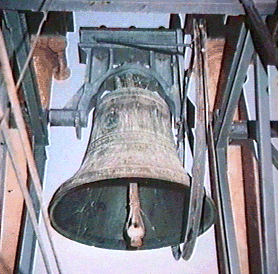Bears, Swans but No Bats in the Belfry
Лить колокола: to tell tall tales, to spread false rumors.

If you are an English speaker, there isn't much to say about bells. Don't ask for whom one tolls (it tolls for thee). Poor Edgar Allan Poe had such paltry lexical pickings for his poem about bells, he could only put in some descriptive verbs (throbbing, sobbing, moaning, groaning) and repeat the darn word dozens of times: "tolling of the bells, of the bells, bells, bells, bells, bells, bells, bells ..."
Now if those fellows spoke Russian, they would have had something substantial to say about bells.
To begin with, in Russian there are some useful bell expressions. Звонить / трезвонить во все колокола means "to shout something from the rooftops." This can be said when someone shares good news with 2,500 of his or her closest personal friends. Or, when a Russian finds someone chattering about a trifle thing as if it were some major event, he would most probably say: "Хорош трезвонить по чем зря!» ("Will you stop talking nonsense!”). But with a different verb, the expression means "to sound the alarm." Когда из сейфа исчезли деньги, я забил во все колокола. (When money disappeared from the safe, I raised the alarm.)
The idea of a bell’s ring is also used to refer to things that one has heard of but doesn’t know anything in particular or has got one’s piece of news wrong: "Слышал звон, а не знает, где он.” This can be interpreted as, "You don’t know what you are talking about!” or better still "You’ve got the wrong sow by the ear.”
Another handy expression is смотреть со своей колокольни ("to see things from one's own point of view"; literally, "to look from one's bell tower"). This can be used to describe someone who is judgmental and narrow-minded. Надо безжалостно бороться с привычкой судить обо всём со своей колокольни. (You have to mercilessly fight the habit of judging everything from your own narrow point of view.) Or, more often today, it can be used to mean "one's side of the story" or "from one's expertise." Он описывает события со своей колокольни, а я - со своей. (He gives his take on events, and I give mine.)
You can do more than look down from your belfry: Плевал я на тебя с высокой колокольни! ("I don't give a hoot for what you think!" literally, "I spit on you from a high bell tower!")
I'm particularly fond of the rather obscure expression лить колокола, which is literally "to cast bells." But it is used to mean "to tell tall tales" or "to spread rumors." Apparently, while a bell was being cast - a complicated process that, if badly done, resulted in a bell with a dull or flat peal - the bell makers would entertain onlookers with wild stories. The wilder the tale they believed, the better the sound of the bell.
Колокольный дворянин (literally, "a bell-tower nobleman") referred to the child of a priest. And the expression Колокол в церковь сзывает, а сам в церкви не бывает (literally, "the bell calls people to church, but doesn't attend church itself") can be said in reference to a hypocrite: Do as I say, not as I do.
For lovers of the arcane, Russia has a fascinating way of describing the function and fate of bells. Not just sleigh bells (usually bells that enclose a clapper, called бубенцы), but bells like набатные (alarm bells), вестовые (news bells) or вечевые (bells that called citizens to the вече, or town council, in Novgorod). Красные колокола are not red bells, but rather sweet-sounding bells. Лыковые колокола ("bast bells") are bells that were broken and held together with bast (woven bark).
Hard to believe, but Russia also has пленные колокола - "captive bells." These were bells of either foreign make, or more often bells captured in raids on foreign cities. And there are even ссыльные колокола: exiled bells. The most famous of them was the bell in the town of Uglich that called citizens to rise up against Ivan the Terrible. The tsar promptly exiled the bell to Siberia. Не убивать гонца, принесшего дурную весть! (Don't shoot the messenger!)
If this weren't enough to redo Poe's poem 50 times, how about this: Each bell has its own name. For example: Вседневный (Everyday) or Широкий (Broad). The Ivan the Great Bell Tower in the Kremlin even has bells named Медведь (the Bear) and Лебедь (the Swan).
Now those are bells that moan and groan!
|












